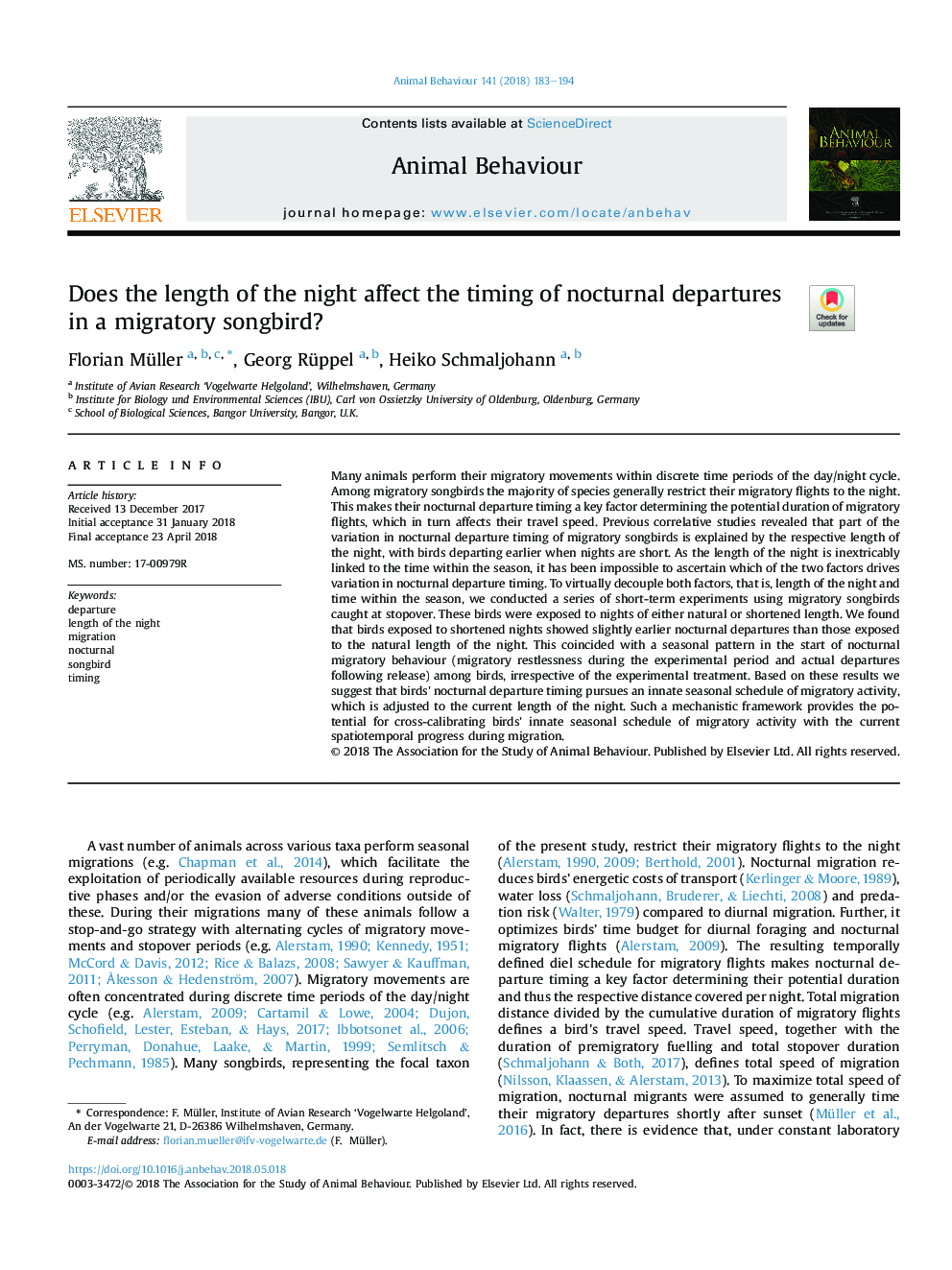| کد مقاله | کد نشریه | سال انتشار | مقاله انگلیسی | نسخه تمام متن |
|---|---|---|---|---|
| 8488503 | 1552187 | 2018 | 12 صفحه PDF | دانلود رایگان |
عنوان انگلیسی مقاله ISI
Does the length of the night affect the timing of nocturnal departures in a migratory songbird?
ترجمه فارسی عنوان
آیا طول شب بر روی زمان خروج از شبانه در یک پرنده مرموز تاثیر می گذارد؟
دانلود مقاله + سفارش ترجمه
دانلود مقاله ISI انگلیسی
رایگان برای ایرانیان
کلمات کلیدی
ترجمه چکیده
بسیاری از حیوانات حرکات مهاجرتی خود را در دوره های گسسته چرخه روز / شب انجام می دهند. در میان پرندگان مرغی، اکثریت گونه ها عموما پرواز مهاجرتی خود را به شب محدود می کنند. این باعث می شود که زمان خروج شبانه آنها یک عامل کلیدی تعیین طول مدت بالقوه پرواز مهاجرتی باشد که به نوبه خود بر سرعت سفر آنها تأثیر می گذارد. مطالعات همبستگی قبلی نشان داد که بخشی از تنوع در زمان خروج شبانه از پرندگان آویزان مروارید با طول مربوط به شب توضیح داده می شود، در حالی که پرندگان قبل از اینکه کوتاه می شوند، دور می شوند. همانطور که طول شب به طور جداگانه با زمان درون فصل مرتبط است، غیر از این است که مشخص شود کدام یک از دو عامل باعث تغییر در زمان خروج شبانه می شود. برای تقسیم هر دو فاکتور، یعنی طول شب و زمان در فصل، تقریبا یک سری آزمایش های کوتاه مدت با استفاده از پرنده های پرنده ای که در توقف حرکت می کردند، انجام دادیم. این پرنده ها به صورت طبیعی یا کوتاه مدت در معرض نور قرار داشتند. ما متوجه شدیم که پرندگان در معرض شبهای کوتاه شده اند کمی قبل از ظهر شبانه روزی نسبت به کسانی که در معرض طول طبیعی شب قرار دارند. این امر با یک الگوی فصلی در آغاز رفتار مهاجرتی شبانه (بیقراری مهاجر در طی دوره آزمایشی و خروج واقعی پس از آزادی) در پرندگان، بدون در نظر گرفتن آزمایش تجربی، همخوانی داشت. بر اساس این نتایج، ما پیشنهاد می کنیم که زمان خروج شبانه پرندگان طی یک برنامه فصلی ذاتی از فعالیت های مهاجرتی دنبال می شود که به طول فعلی شبانه تنظیم می شود. چارچوب چارچوب مکانیکی پتانسیل برنامه های فصلی ذاتی دوره ای از فعالیت های مهاجرت را با پیشرفت فضایی شیب دار در طی مهاجرت فراهم می کند.
موضوعات مرتبط
علوم زیستی و بیوفناوری
علوم کشاورزی و بیولوژیک
علوم دامی و جانورشناسی
چکیده انگلیسی
Many animals perform their migratory movements within discrete time periods of the day/night cycle. Among migratory songbirds the majority of species generally restrict their migratory flights to the night. This makes their nocturnal departure timing a key factor determining the potential duration of migratory flights, which in turn affects their travel speed. Previous correlative studies revealed that part of the variation in nocturnal departure timing of migratory songbirds is explained by the respective length of the night, with birds departing earlier when nights are short. As the length of the night is inextricably linked to the time within the season, it has been impossible to ascertain which of the two factors drives variation in nocturnal departure timing. To virtually decouple both factors, that is, length of the night and time within the season, we conducted a series of short-term experiments using migratory songbirds caught at stopover. These birds were exposed to nights of either natural or shortened length. We found that birds exposed to shortened nights showed slightly earlier nocturnal departures than those exposed to the natural length of the night. This coincided with a seasonal pattern in the start of nocturnal migratory behaviour (migratory restlessness during the experimental period and actual departures following release) among birds, irrespective of the experimental treatment. Based on these results we suggest that birds' nocturnal departure timing pursues an innate seasonal schedule of migratory activity, which is adjusted to the current length of the night. Such a mechanistic framework provides the potential for cross-calibrating birds' innate seasonal schedule of migratory activity with the current spatiotemporal progress during migration.
ناشر
Database: Elsevier - ScienceDirect (ساینس دایرکت)
Journal: Animal Behaviour - Volume 141, July 2018, Pages 183-194
Journal: Animal Behaviour - Volume 141, July 2018, Pages 183-194
نویسندگان
Florian Müller, Georg Rüppel, Heiko Schmaljohann,
